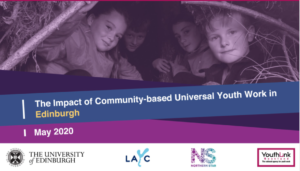
The experiences and behaviour of young people have been front and centre in media coverage of the ongoing Covid-19 pandemic. We’ve witnessed outpourings of genuine public and political concern for the impact of the current situation on young people’s education, employment prospects and above all their wellbeing. The future for all of us remains uncertain, but for the current generation of young Scots, it’s difficult not to be especially concerned on their behalf.
Despite the recent challenges, the youth work sector in Scotland has continued to engage with young people. Unrelentingly and with little fuss, organisations have been creative in hastily adapting their services and professional practice to stay connected with young people and their families. The shift to online engagement has been unavoidable, with many practitioners having to upskill quickly to adapt. Digital youth work has been taking hold in the sector over recent years, but until these past few months progress had been modest! Like many other community services, the impact of Covid-19 has pushed youth workers to fully ‘grasp the thistle’ of technology. The operation of the sector has been transformed, with practitioners utilising an array of online platforms to ensure that young people stay or become engaged with local services. At this time, access to youth work has become more essential than ever for those young people struggling with life during the pandemic.
The impact of the youth work sector often goes unheralded in terms of the unique role it plays in supporting young people, the previous six months have been no different. Over the past two years, important research undertaken across Scotland has begun to generate an evidence base of the impact of universal youth work in our local communities. Across three studies undertaken to date, around 300 stories have been collected first-hand from young people; with a focus on significant change arising from their participation in universal youth work. A consistent picture has emerged from this data, confirming the key role youth work plays in building young people’s confidence and supporting them to develop essential life skills. Common to these outcomes is the long-term and trusting relationships developed between young people and adult practitioners. The consistent findings of the research also point to the importance of youth work as an informal educational practice setting that offers a safe place for young people to meet and reflect on issues important in their lives.
At present, youth work is predominantly taking place online or remotely. Young people are commonly viewed as pioneers of the digital age, however this is a limited perspective. While we recognise young people as active agents in the ongoing digitalisation of Scottish society, there is also concern for their online vulnerability. Youth work has always strived to respond to young people’s needs across a broad spectrum of intervention and purpose, online this is no different. There is an obvious requirement for youth workers to consider the potential of ‘hybrid practice’ as the new normal. Clearly, practitioners must become more tech savvy and digitally literate in order to remain effective in their online engagement with young people. Digital youth work can no longer be seen as a specialism nor merely a complimentary approach, it will be (some may say at long last) at the centre of practice.
Continued change seems inevitable. The current context presents new challenges and raises fresh questions for the sector. What would a new manifesto for Hybrid Youth Work look like? How will the core knowledge and skills base change for practitioners? How do youth work organisations ensure inclusion, access and safety for young people both online and offline? What are the consequences for youth worker training? What are the resource implications? Learning from research, particularly evidence of impact, will be crucial to ensure the sector remains effective in meeting young people’s needs and supporting them to achieve their potential as we all move slowly towards a post-Covid time.
You can read the full report here.